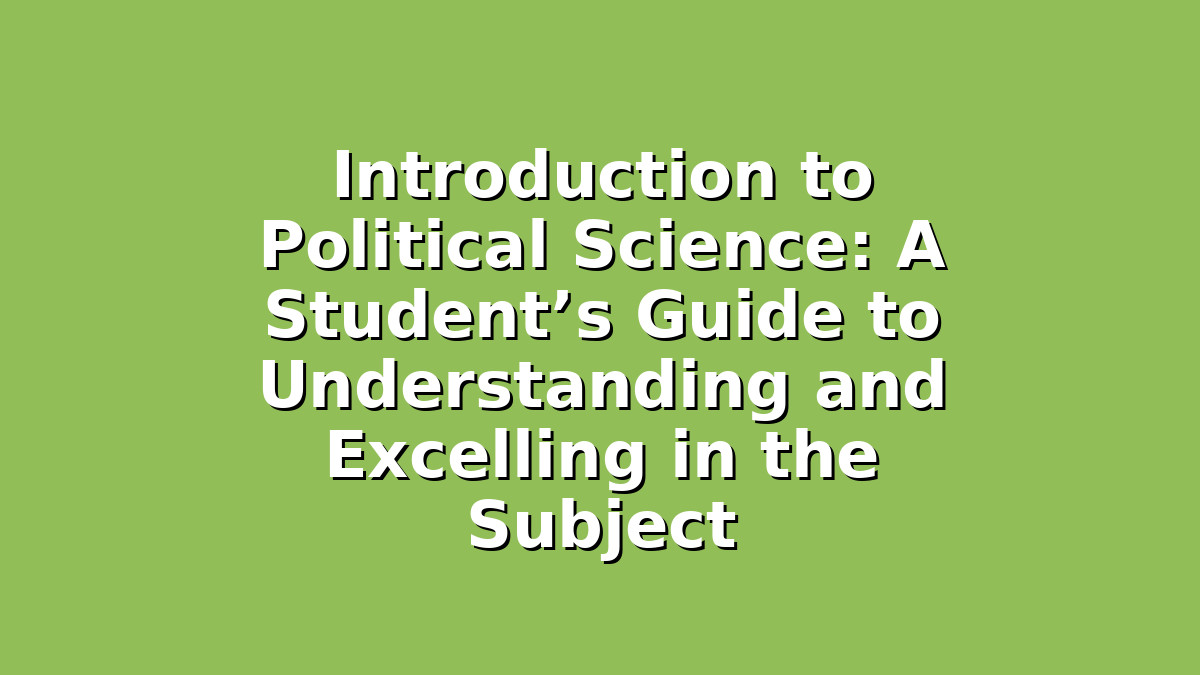Political Science is an exciting and vital field that explores how societies govern themselves, how power is distributed, and how policies are made and implemented. For students preparing for exams or seeking effective ways to study this subject, mastering Political Science can open doors to careers in law, public administration, international relations, and more. This guide is designed to introduce you to the essentials of Political Science and provide practical study tips to help you succeed.
Understanding the Basics of Political Science
Before diving into study techniques, it’s important to understand what Political Science encompasses. At its core, Political Science examines systems of governance, political behavior, and institutional structures. The subject typically covers topics such as:
– Political Theories and Ideologies: Understanding different schools of thought like liberalism, conservatism, socialism, and feminism helps you analyze political arguments critically.
– Government Structures and Functions: Learn about the various forms of government — democracy, authoritarianism, monarchy — and how they function at local, national, and international levels.
– International Relations: Study how countries interact, including diplomacy, conflict, trade, and global organizations like the United Nations.
– Public Policy and Administration: Explore how policies are created, implemented, and their impact on society.
Recognizing these fundamental areas sets a strong foundation and helps you focus your studies effectively.
Section 1: How to Approach Political Science Content for Exam Success
Political Science can seem overwhelming because it involves a mix of theoretical concepts and real-world events. Here are some strategies to help you approach the content confidently:
1. Create a Structured Study Plan: Break down your syllabus into manageable parts. Allocate specific days for political theories, government types, international relations, and current affairs. Consistency beats last-minute cramming.
2. Focus on Key Terms and Concepts: Political Science involves a lot of terminology. Make flashcards or use apps like Quizlet to memorize definitions, theorists’ names, and key dates. Understanding concepts rather than rote memorization will help you apply knowledge in exams.
3. Use Diagrams and Charts: Visual aids like flowcharts showing government structures or mind maps linking political ideologies can clarify complex information and improve recall.
4. Relate Theory to Current Events: Applying theories to contemporary political news makes learning more relevant and engaging. For example, link the concept of federalism to the governance system of your country or analyze election strategies through political behavior theories.
Section 2: Effective Study Techniques Tailored for Political Science
To deepen your comprehension and prepare effectively, consider these study techniques:
1. Active Reading and Note-Taking: Political Science texts can be dense. Practice active reading by highlighting key points and writing summaries in your own words. Cornell notes can help organize information systematically.
2. Group Discussions and Debates: Engage with peers to discuss political ideas and current affairs. Debating opposing views sharpens critical thinking and helps you articulate arguments clearly—an essential skill for essay-based exams.
3. Past Exam Papers and Practice Questions: Familiarize yourself with the exam format by solving previous years’ papers. This practice builds confidence and highlights commonly tested themes, helping you focus your revision.
4. Use Multiple Resources: Don’t rely solely on a single textbook. Supplement your learning with online lectures, podcasts, documentaries, and reputable news sources. Diverse perspectives enrich your understanding.
5. Teach What You Learn: Explaining concepts to friends or even to yourself aloud reinforces memory and highlights areas needing more clarity.
Section 3: Managing Exam Stress and Staying Motivated
Studying Political Science requires time and mental energy, which can sometimes feel stressful. Here are tips to stay motivated and maintain your well-being:
1. Set Realistic Goals: Break your study goals into daily or weekly targets. Celebrate small achievements to keep your motivation high.
2. Balance Study with Breaks: Follow techniques like the Pomodoro method—study for 25 minutes, then take a 5-minute break. This maintains focus and prevents burnout.
3. Stay Informed Without Overwhelm: Keep abreast of current events but avoid information overload. Choose a few trusted news sources and set specific times for catching up.
4. Practice Mindfulness and Relaxation: Techniques such as meditation, deep breathing, or light exercise can reduce anxiety and improve concentration.
5. Reach Out for Help: If you struggle with certain topics, don’t hesitate to ask teachers, join study groups, or seek online forums. Collaborative learning often provides new insights.
Conclusion
Political Science is a fascinating subject that not only prepares you for exams but also equips you with critical thinking skills and a deeper understanding of the world. By breaking down the material into manageable sections, actively engaging with concepts, practicing regularly, and taking care of your mental health, you can excel in this discipline. Remember, mastery comes with consistent effort and a genuine interest in how politics shapes our society. Stay curious, stay organized, and keep moving forward—you’ve got this!

Responses